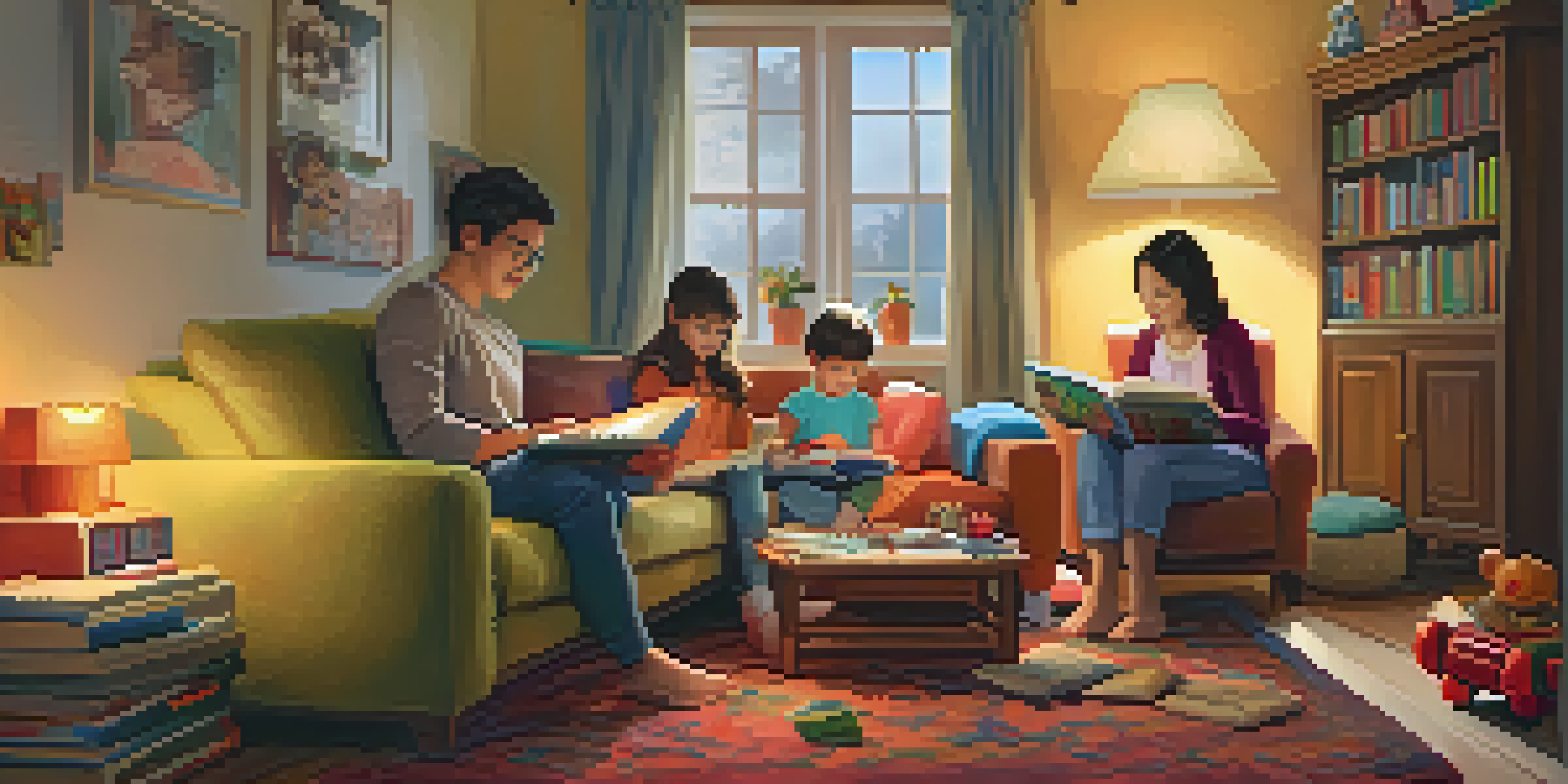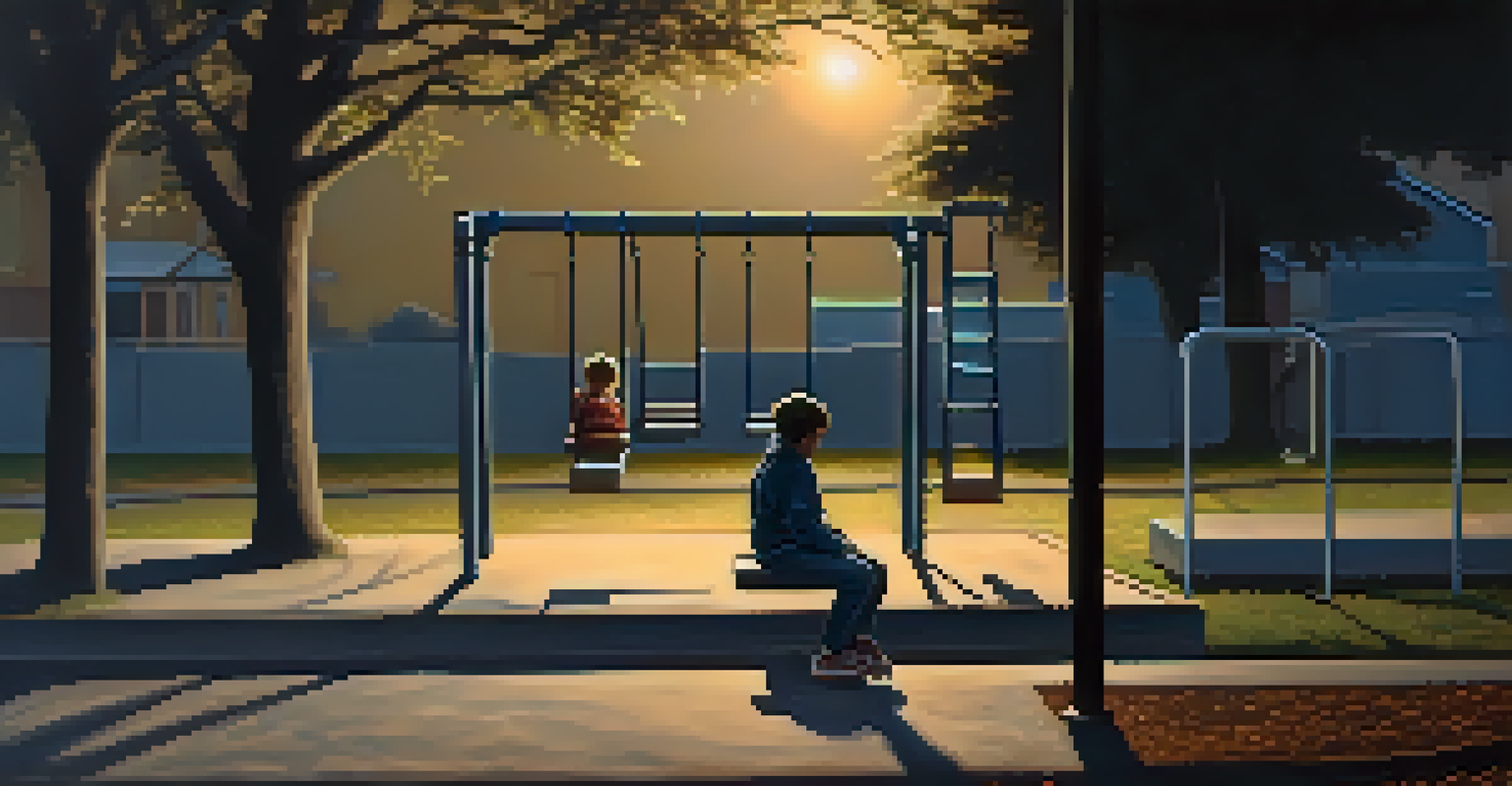Parenting Styles in Film: Reflection of Societal Norms

The Role of Film in Shaping Parenting Perspectives
Films have long served as a reflection of societal norms, including parenting styles. They provide a lens through which audiences can explore different approaches to raising children. This ability to encapsulate complex family dynamics in a few hours of storytelling makes cinema a powerful tool for cultural commentary.
Cinema can bring communities together and offer new perspectives on parenting, helping us understand our roles within the family.
With each era, films reveal the prevailing attitudes towards parenting, often mirroring the values of the time. For instance, the 1950s showcased traditional, authoritative parenting, while more contemporary films often feature permissive or neglectful styles. These shifts in portrayal highlight how societal changes influence family structures and child-rearing practices.
By analyzing these cinematic representations, we gain insights into the evolving nature of parenting. Films not only entertain but also challenge audiences to reflect on their own parenting philosophies, fostering discussions about what it means to raise a child in today's world.
Authoritative Parenting in Classic Cinema
Authoritative parenting, characterized by high expectations and support, is often depicted in classic films. Movies like 'The Sound of Music' showcase parents who balance discipline with warmth, providing a nurturing environment for children. This style resonates with audiences as it often leads to positive outcomes for the characters involved.

In these films, the authoritative parent is typically portrayed as a role model, guiding their children through life's challenges. Their balanced approach allows for open communication, encouraging children to express themselves while also respecting boundaries. This creates a relatable dynamic that audiences can admire and aspire to replicate.
Films Reflect Parenting Styles
Movies serve as a mirror to societal norms, showcasing how different parenting styles evolve over time.
The lasting appeal of these portrayals can be seen in the influence they have on real-life parenting practices. Many viewers recognize the value of the authoritative style, often striving to embody these qualities in their own parenting journeys.
The Impact of Permissive Parenting in Modern Films
Permissive parenting often appears in modern films, showcasing a more laid-back approach to child-rearing. Movies like 'The Parent Trap' feature parents who prioritize friendship over authority, allowing children significant freedom. While this can lead to fun and humorous situations, it also raises questions about boundaries and responsibility.
Films express the complexities of parenting and challenge us to reflect on our values and practices as caregivers.
In these narratives, the lack of structure can lead to chaotic family dynamics, highlighting the potential downsides of permissiveness. Characters often find themselves navigating the consequences of their parents' choices, which can serve as cautionary tales for viewers. These portrayals encourage audiences to consider the balance between freedom and guidance in their own parenting.
As society evolves, these films reflect a growing trend towards flexibility in parenting styles, prompting discussions about the effectiveness of permissive approaches. While they may resonate with some, they also challenge traditional notions of discipline and control.
Neglectful Parenting: A Reflection of Societal Issues
Neglectful parenting is a theme that emerges in many films, often highlighting broader societal issues. Movies like 'Precious' depict the harsh realities faced by children in neglectful environments, drawing attention to the emotional and psychological impact on young lives. These stories serve as powerful reminders of the consequences of parental absence.
Through these narratives, filmmakers aim to provoke empathy and understanding among audiences. By showcasing the struggles of neglected children, they encourage viewers to reflect on the importance of parental involvement and support. This reflection can lead to discussions about the societal factors contributing to neglect, such as poverty and mental health.
Diverse Portrayals of Single Parents
Contemporary films highlight the unique experiences of single parents, fostering empathy and understanding in audiences.
The portrayal of neglectful parenting in film can inspire action and awareness, motivating society to address these issues. By bringing these stories to light, filmmakers empower audiences to advocate for change and support children in need.
Single Parenting: Diverse Experiences in Film
Single parenting is a theme that has gained visibility in contemporary cinema, showcasing the diverse experiences of single parents. Films like 'Kramer vs. Kramer' delve into the challenges and triumphs of raising children alone, portraying a realistic view of single parenthood. This representation resonates with many viewers, reflecting the growing prevalence of single-parent families in society.
These films often explore the emotional struggles faced by single parents, from financial concerns to balancing work and family life. They highlight the resilience and strength required to navigate these challenges, making single parents relatable figures in the eyes of the audience. Through their journeys, viewers gain insight into the complexities of single parenting.
By presenting a variety of single-parent experiences, filmmakers contribute to a more nuanced understanding of family dynamics. This visibility fosters empathy and support for single parents, encouraging society to recognize and value their contributions to family life.
Cultural Variations in Parenting Styles in Film
Cinematic portrayals of parenting styles often vary across cultures, reflecting different societal values and norms. Films from various regions showcase unique approaches to child-rearing, allowing audiences to appreciate the diversity of parenting across the globe. For instance, Japanese films like 'Shoplifters' depict communal parenting, where extended family plays a crucial role in raising children.
These cultural variations enrich our understanding of parenting, as they challenge the notion of a singular 'correct' way to raise a child. By exposing viewers to different practices, filmmakers encourage dialogue about the effectiveness and appropriateness of various parenting styles in different contexts. This promotes a broader appreciation for the nuances of family life.
Cultural Variations in Parenting
Cinematic representations of parenting across cultures reveal diverse approaches to child-rearing, encouraging dialogue about family dynamics.
As globalization continues to shape our world, the blending of parenting styles in film reflects the interconnectedness of societies. This fusion invites audiences to explore and learn from diverse cultural practices, ultimately enriching their own parenting philosophies.
The Future of Parenting in Film: Trends and Predictions
As societal norms continue to evolve, so too will the portrayal of parenting in film. Emerging trends suggest a shift towards more inclusive and diverse representations of family structures. Expect to see more films that highlight co-parenting, LGBTQ+ parents, and blended families, reflecting the realities of modern life.
These evolving narratives will challenge traditional stereotypes and offer fresh perspectives on parenting. Filmmakers are increasingly recognizing the importance of authenticity in storytelling, leading to more relatable and genuine portrayals. This shift not only entertains but also educates audiences about the complexities of contemporary family dynamics.

Looking ahead, the film industry has the opportunity to shape societal perceptions of parenting positively. By continuing to explore various styles and structures, filmmakers can inspire audiences to embrace diversity and foster understanding in their own parenting journeys.